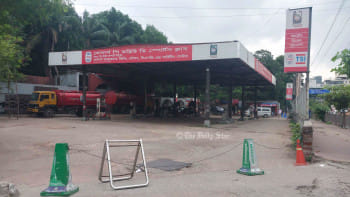Is Gaibandha-5 by-poll a prelude to the main show?

With the next parliamentary election of Bangladesh a year away, the widespread irregularities at the by-election to the Gaibandha-5 constituency on Wednesday – which led to four candidates out of five boycotting the by-polls – has raised some questions, including if this EC would be able to hold a free, fair, and inclusive general election after all.
The scenario was all too familiar. Supporters of the ruling party candidate were seen taking over the polling centres, while CCTV cameras were removed from a number of polling stations and votes were rigged. The chaos prompted the EC to suspend voting, which was a commendable move considering the election experiences of the last two commissions.
The EC Secretariat monitored the voting process from Dhaka, thanks to the recently introduced CCTV cameras installed in all the polling centres. Chief Election Commissioner (CEC) Kazi Habibul Awal said the commission had stopped voting as the situation had gone out of control. He, however, refrained from specifying who was responsible for the irregularities.
Here lies the big question.
The role of law enforcement agencies is a crucial factor here. If they were active enough, outsiders could not have entered the polling stations. Why did the law enforcement law enforcement agencies fail so miserably to play their due role during the election? A voting booth is a sacred place for a voter to exercise their electoral franchise as it ensures confidentiality and privacy. But that was breached in the by-polls. The CEC said the commission had seen people entering the voting booths. The EC has to rely mainly on law enforcement agencies to stop all sorts of irregularities during an election. But it seems the EC was not able to utilise the law enforcement agencies in Gaibandha, and they had to exercise the maximum authority at their disposal. The CEC's statement, once again, demonstrated that electronic voting machines (EVMs) were vulnerable to manipulation if the local administration and law enforcement agencies failed or refused to carry out their responsibilities.
Although the commission has been repeatedly stressing the use of EVMs to hold a free and fair election, this Gaibandha-5 by-polls have exposed that these innocuous machines alone cannot be a means to end election irregularities, unless other issues – such as ensuring that citizens can vote without fear, for instance – are not addressed.
Political parties, observers, and experts have long been saying that the Election Commission should work more on improving the environment so as to restore public trust in the country's electoral system. What happened in Gaibandha-5 on Wednesday was an eye-opener for the commission to work on these issues to ensure a free, fair, and inclusive election.
The commission can say that they took the right step by stopping the voting. But they need to find out why such a situation arose in the first place. Was it preventable?

There is no doubt that this by-election will give an upper hand to the opposition parties to reinforce their stance that a free and fair election would not be possible under this EC as well as the incumbent government.
So, to dispel the commotion among the opposition parties, the commission needs to investigate in earnest to find out why the situation went out of control in Gaibandha-5, and who was behind it. They also need to ponder the course of action leading up to the 12th parliamentary election that is scheduled to be held in late 2023 or early 2024.
The CEC reaffirmed that all the EVMs used in the Gaibandha-5 by-polls had been working properly.
"There was no mechanical problem during the election and all the EVMs worked properly. The problem was caused by the people. To find out who were responsible for the malpractice, a thorough investigation is needed," the CEC told reporters on Wednesday.
The CEC said on Thursday that the commission had formed a probe committee to look into the irregularities and submit a report within seven days. Yes, an investigation is needed. But people would be more interested to see the investigation results identifying the culprits and ensuring their punishment. Otherwise, the EC's action, which they took from their constitutional obligations, will not make much difference.
In Gaibandha, the EC may have done the right thing, at least in appearance, but is stopping the polling on an election day to prevent irregularities all they should do? What people expect is that the commission would make sure all measures are in place long before the voting day so that no one would get any scope to engage in irregular activities.
One wonders how the EC would tackle possible irregularities during the general election, when voting would take place in 300 constituencies on a single day. Will it be possible for the EC to install enough CCTV cameras in all 300 constituencies? Will it be realistic for the EC to monitor all the polling stations through CCTV cameras? Will it stop voting in all 300 seats in case of widespread irregularities?
Mohammad Al-Masum Molla is deputy chief reporter at The Daily Star.

 For all latest news, follow The Daily Star's Google News channel.
For all latest news, follow The Daily Star's Google News channel. 









Comments